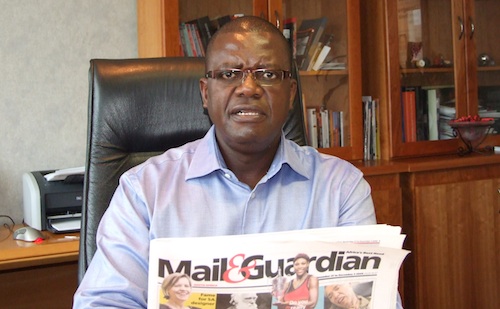Google is no friend of the newspaper industry. That’s the view of newspaper publisher Trevor Ncube, who agrees with News Corp chairman Rupert Murdoch that newspapers need to find ways of charging readers to access content on their websites.
Ncube, pictured, who recently attended the World Association of Newspapers conference in Hyderabad, India, says Murdoch is not fighting a lone crusade against Google and is not the only publisher that plans to erect pay walls around its websites and to block the search engine company from republishing copyrighted material.
Rather, Ncube, who is deputy chairman of Mail & Guardian owner M&G Media and publisher of Zimbabwe’s soon-to-be-launched independent daily, NewsDay, says almost the entire newspaper industry worldwide is behind Murdoch’s efforts to stave off the “threat” from Google and to get readers to pay for content online.
“We need to be clear that this is not just Murdoch vs Google,” he says. “Murdoch has been bold and outspoken, but, to a very large extent, the rest of the industry is behind what he is doing.”
Google thinks it can “dictate to us what the business model should be” because of its “dominance on the Internet”. “Now publishers are saying, ‘no thank you, it’s our content after all’.”
Ncube says Google has made it clear that it doesn’t want to deal with publishers as a united body. “They want to pick us off one by one,” Ncube says. “They want to attack us as individual publishers and not deal with us as a group. That smacks of negotiating in bad faith. Google should be dealing with the whole industry to find a solution.”
Ncube says he is “amazed” at how the media celebrates Google, despite the fact that it is a “monopoly”. Other “monopolies” are treated with disdain. “I rather use [Microsoft search engine] Bing. It’s kind of a one-man protest,” he says in jest.
“There’s this sense that Google is bullying us and that, because we don’t have the power to monetise our content, we should roll over and accept whatever Google comes up with. Publishers are saying ‘absolutely not’, that this is ruining our businesses and our livelihoods.”
Murdoch and other publishers have blamed Google for building its business — by selling advertising — on the back of other people’s content.
Google SA country manager Stephen Newton says in a prepared statement in response to a query from TechCentral that Web search and Google News — the latter aggregates the world’s online news sources — are “tremendous sources of promotion for news organisations”. Google News sends publishers about 100 000 clicks a minute, Newton says.
“Each of these visits offers offers a business opportunity for publishers to show ads, win loyal readers and sell subscriptions,” he says. “News publishers can charge for their content while at the same time ensuring that it’s discovered through Google — these two are not mutually exclusive.”
Of course, publishers themselves are also largely to blame for the situation they’re in, Ncube says. In developed markets, particularly in the US, readers are abandoning newspapers for free online content.
“Newspapers committed a cardinal sin — they gave away their content for free on the Internet,” Ncube says. “It’s easy to say this with the benefit of hindsight. None of us knew how the Internet was going to develop.”
What galls Ncube is that some journalists are writing the epitaph for their own industry. “We go around telling the whole world that our profession is dying and the world is starting to believe that.”
It’s true that newspaper publishers were too slow to react to technological change. Now, corrective action is needed, he says. “We have created an impression that content should be free. We have to disabuse people of that notion.”
But how? The answer, Ncube says, lies in charging for quality reporting and in-depth analysis and providing commodity news free of charge. “I have long maintained that the free content model is broken and is unsustainable. There is nothing in this world that is for free. Quality journalism costs money to produce, so how can we be expected to put that quality journalism for free on the Internet?”
Unfortunately, the advertising model that helps pay for journalism at newspapers doesn’t appear to be gaining traction on the Web, Ncube says.
But throwing up pay walls and asking readers to open their wallets could also prove challenging. Many consumers, especially youngsters accustomed to free content online, may baulk at the idea of having to pay for news articles.
Then there’s the small matter of figuring out how to facilitate payments, even if people are prepared to pay. A universally accepted micro-payments system doesn’t exist yet. People will be annoyed if they’re expected to haul out their credit cards every time they want to spend 50c on a news website.
Despite the challenges, Ncube says he remains optimistic about the future of journalism. “We have already been through the worst,” he says. “We have not yet found the right model, but it’s becoming clearer what we need to do.”
For now, the industry is going through a period of introspection. “We can’t continue with business as usual because this isn’t business as usual.” — Duncan McLeod, TechCentral





